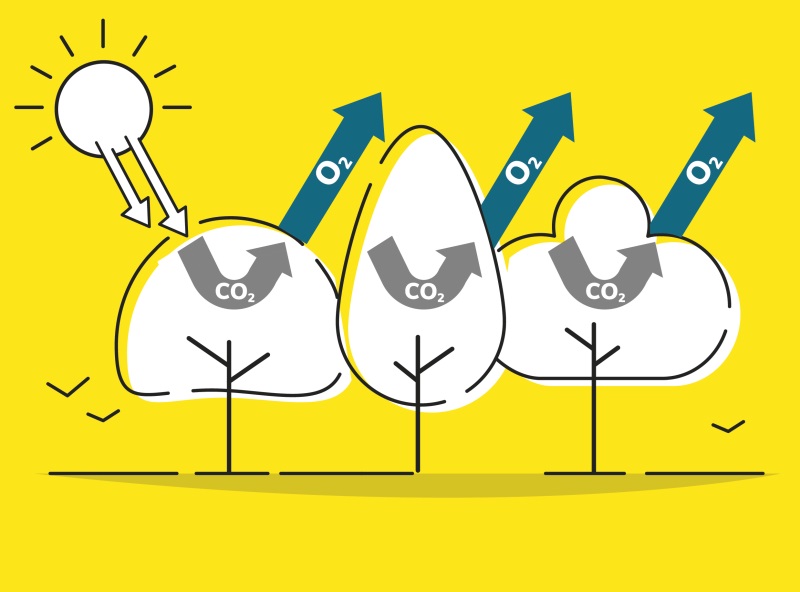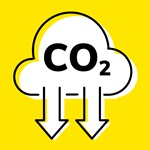
All about greenhouse gases
Greenhouse effect: Definition
An entirely natural phenomenon...

Contrary to what is often thought, the greenhouse effect is a beneficial natural phenomenon that provides us with a comfortable temperature on the planet.
When sun rays bathe the Earth in their heat, the ground heats up and sends out infrared radiation into the atmosphere. And it is due to greenhouse gases, including CO2 and water vapor that these warm rays remain trapped in the atmosphere, as if the earth were covered by a bell jar or inside a greenhouse.

Did you know ? Without greenhouse gases, the temperature on Earth would be around -20° as opposed to 15° which is the temperature we now enjoy.
These gases are the result of oil, gas, and coal combustion, fermentation of plants, livestock digestion, and chemical product emission.
Excess greenhouse gas emissions can be harmful over the long term. This is precisely the phenomenon that causes global warming. It is referred to the additional greenhouse effect.
When the Earth is heated by the sun, it emits infrared radiation into the atmosphere. Some of this radiation is trapped by the greenhouse gases that give us a mild temperature on the surface of the planet.
Additional greenhouse effect

The presence of these gases, most of which are related to human activity, notably since the dawn of the industrial revolution, contribute to the planet’s warming by exacerbating the natural greenhouse effect. This is the additional greenhouse effect. The planet is heating up, resulting in climate change that manifests itself as fires, heat waves, droughts, sea level rise, ecosystem disturbances, glaciation, etc.
Plants and plankton capture carbon dioxide in the atmosphere and transform it into oxygen through a process known as photosynthesis. Forests absorb carbon dioxide and transform it into wood, humus, and oxygen. These phenomena are called “carbon sinks.”

Since the 19th century, humans have been consuming more fossil energies (gas, coal, oil) and releasing much more greenhouse gas into the atmosphere. The average temperature of the planet has increased by 1.1°C since the beginning of the industrial era. In addition to all the highly pollutant industrial activity, deforestation has strongly contributed to destroying carbon sinks, which help guarantee a certain climate equilibrium.
Global warming also gradually causes the melting of permafrost, which in turn releases large amounts of carbon dioxide and methane, probably neutralized for thousands of years. This is notably occurring in Greenland, Alaska, Canada, and Russia.
The most recent projections concerning the Arctic, part of a UN study, demonstrate that winter temperatures will have increased there by 3° to 5° by 2050.
Greenhouse gases: What concrete steps to take?
Greenhouse gases: What if tomorrow we stopped everything?

What would happen tomorrow if we stopped all CO2 emissions? Is the phenomenon reversible? Unfortunately, the evaporation times for greenhouse gases can be very long. When comparing water vapor which disappears within a few days in the atmosphere and halogen gases which remain trapped for 50,000, it is clear that the issues are not the same.
- CO2, produced in large quantities by human activity, including industrial, heating, and transportation activities, remains trapped for a century in the atmosphere.
- For methane, resulting from plant fermentation and retaining 20x more infrared radiation than carbon dioxide, this time period is lower, around 12 years.
- Nitrous oxide, released by fertilizer, oceans, and undergrowth humus, retains 300 times more infrared radiation than CO2 and remains 120 years in the atmosphere.
- Certain halogen gases such as CF4 remain trapped there more than 50,000 years.
- F-gases (fluorinated gases), CFCs (for example, present in air conditioning and refrigeration systems), PFCs (perfluorocarbons), generated by the industrial processes, and SF6 (sulfur hexafluoride), related to electric equipment, are also extremely powerful and pollutant greenhouse gases.
If we were to stop everything today, i.e. the emission of excess greenhouse gases contributing to climate change, the mechanisms triggered would continue to act for at least 100 years. The temperatures would continue to rise as long as the infamous incriminated gases were still in the atmosphere.
Reducing greenhouse gas emissions: A major issue for the planet
 According to the IPCC, it is crucial to reduce greenhouse emissions around the world from 40% to 70% by 2050 (compared to the 2010 level) and to move toward an economy nearly carbon-neutral during the second half of the 21st century.
According to the IPCC, it is crucial to reduce greenhouse emissions around the world from 40% to 70% by 2050 (compared to the 2010 level) and to move toward an economy nearly carbon-neutral during the second half of the 21st century.
The UN raised the alert, a few days before COP26, that the climate outlook would be “catastrophic” if real change is not considered by Member States.
Zeke Hausfather, a climatologist and former researcher at Berkeley, asserts that if the countries responsible for two thirds of worldwide emissions and that have committed to reaching carbon neutrality by 2050 keep their promises, there is reason to hope that one of the most optimist scenarios advanced by the IPCC will be possible.
Greenhouse gases and the nuclear industry: Commonly held beliefs
According to a recent study by the survey group BVA for Orano (2021), 58% of the French public thinks the nuclear energy produces CO₂ and contributes to climate change.
In all scenarios envisaged by IPCC, reducing greenhouse gas emissions involves using much more nuclear energy to produce electricity in the years ahead, or more than double current usage between 2020 and 2050.
The European commissioner for the interior market and energy stresses the need to consider nuclear energy as an asset for the energy transition that we are facing. This is in line with the recommendations of IPCC and International Energy Agency.
- Nuclear Energy and the Climate Challenge The capacity of nuclear energy to guarantee low-carbon electricity generation is invaluable to deal with the climate emergency
- Expert voices - Nuclear power and renewable energies: a winning combination for the climate Nuclear power and renewables... People often oppose them, even though they both contribute to the low-carbon energy transition that everyone is calling for to fight global warming.
- What does acting for the climate mean? Climate change, CO₂ emissions: taking action for the climate is an urgent matter. As a major player in the energy transition, Orano is committed.